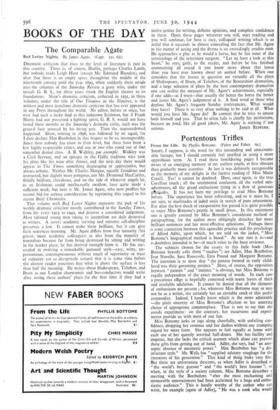BOOKS OF THE DAY
The Comparable Agate
Red Letter Nights. By James Agate. (Cape. 12s. 6d.) DRAMATIC criticism that rises to the level of literature is rare in this country. There is, of course, Hazlitt, perhaps Charles Lamb, but nobody reads Leigh Hunt (except Mr. Edmund Blunden), and after that there is an empty space throughout the middle of the nineteenth century until the year 1895, when suddenly there strode into the columns of the Saturday Review a giant who, under the initials G. B. S., for three years shook the English theatre to its foundations. Shaw's dramatic criticism, collected in 1931, in three volumes, under the title of Our Theatres in the Nineties, is the wittiest and most trenchant dramatic criticism that has ever appeared in any Press throughout the world. No editor, before or since, has ever had such a lucky find as this unknown Irishman, but if Frank Harris had not possessed a fighting spirit, G. B. S. would not have lasted three months as the Saturday's dramatic critic, such was the general fury aroused by his biting pen. Then the unprecedented happened. Shaw, retiring in 1898, was followed by an equal, for I dare declare Max Beerbohm in this respect to be so, incomparably. Since then nobody has risen to their level, but there have been a few highly respectable critics, and one or two who stand out of that somewhat dismal class. A. B. Walkley, par exemple. Walkley was a Civil Servant, and an epicure in the Gallic tradition who took his plays like his wine after dinner, and the next day there would appear in The Times something disparaging or appreciative, but always urbane. Neither Mr. Charles Morgan, equally fastidious and instructed, but slightly more pompous, nor Mr. Desmond MacCarthy, fitfully brilliant, chivalrous, and on the side of whatever angels he, as an Irishman, could intellectually swallow, have quite made a sufficient mark, but here is Mr. James Agate, who now proffers his second bid for serious consideration by reprinting this sequel to his recent Brief Chronicles.
That volume with Red Letter Nights represent the pick of his weekly dramatic criticism mostly contributed to the Sunday Times, from the years 1923 to 1943, and deserve a considered judgement. Most talented young men taking to journalism are duly destroyed as writers. A severe academic training and extreme self-discipline preserves a few. It cannot make them brilliant, but it can give their sentences meaning. Mr. Agate differs from that minority (his graver, more academic colleagues) as also from the. majority of journalists because far from being destroyed by sitting and writing in the market place, he has derived strength from it. He has suc- ceeded in evolving a remarkable personal style—easy, witty, un- pretentious, contemporaneous without touch of superiority or trace of vulgarity yet so deceptively natural that it is some time before the alertest reader perceives that what is above the surface is less than half the meaning. He writes about Shakespeare, Tchehov, and Ibsen as our London charwomen and bus-conductors would write after seeing these authors' plays for the first time if they had a
native genius for writing, definite opinions, and complete confidence in them. Open these pages wherever you will, start reading and you will continue, for here is racy, colloquial writing which is so artful that it succeeds in almost concealing the fact that Mr. Agate in the matter of acting and the drama is an exceedingly erudite man. He approaches a play as he would a horse, but he has none of the terminology of the veterinary surgeon. " Let us have a look at this beast," he says, gaily, to the reader, and before he has finished commenting all round it you know more about that horse than you have ever known about an animal before. When one considers that the horses in question are virtually all the plays of Shakespeare, of Ibsen, of Tchehov, of the Restoration dramatists, and a large selection of plays by the best contemporary dramatists one can realise the measure of Mr. Agate's achievement, especially if one adds—as I must—that usually the better the horse the better and juster Mr. Agate's judgement of it. A final word to those who deplore Mr. Agate's frequent Sunday irrelevancies. What would they have? There is so very often nothing to be said at all. What would you have Mr. Agate do? Be content that he tries to amuse both himself and you. That he often fails is chiefly his misfortune, because au fond, like all good jokers, Mr. Agate is nothing if 'not






























 Previous page
Previous page